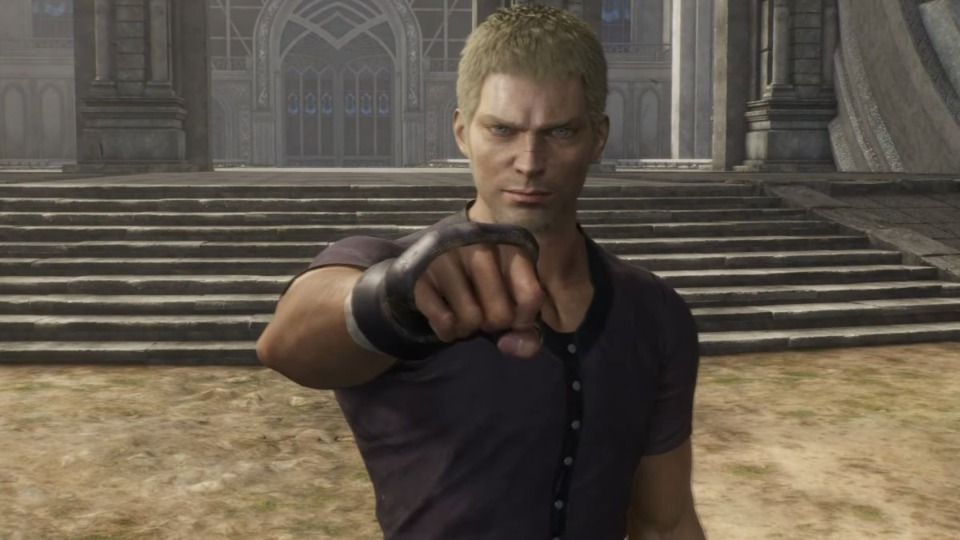Finishing Stranger of Paradise: Final Fantasy Origin [Part 1] - This Blog Is Sponsored By CHAOS!
By ZombiePie 5 Comments
Author's Note: SPOILER WARNING! This is a two-part series looking at Stranger of Paradise: Final Fantasy Origin. While this episode primarily discusses mechanics and gameplay, it is not entirely free from story spoilers. You have been warned.
Also, if you enjoyed this episode, here's a directory to the first episodes of every Final Fantasy game I have covered on this site thus far:
- Part 1 of Final Fantasy I series
- Part 1 of Final Fantasy II series
- Part 1 of Final Fantasy V series
- Part 1 of Final Fantasy VI series
- Part 1 of Final Fantasy VII series
- Part 1 of Final Fantasy VIII series
- Part 1 of Final Fantasy IX series
- Part 1 of Final Fantasy X series
- Part 1 of Final Fantasy X-2 series
- Part 1 of Final Fantasy XI series
- Part 1 of Final Fantasy XII series
- Part 1 of Final Fantasy XIII series
- Part 1 of Final Fantasy XIII-2 series
- Part 1 of Lightning Returns: Final Fantasy XIII series
Preamble: I Hate Souls Games! There, I Said It!
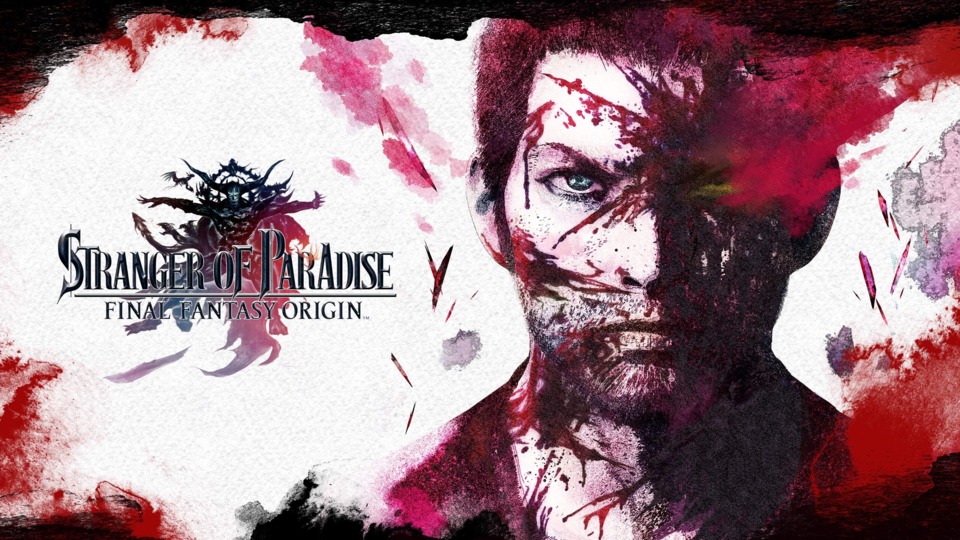
Stop the press, people are talking about Final Fantasy games, and it's not entirely negative! Many of you are playing and enjoying Final Fantasy XVI and waiting in anticipation for more details about Final Fantasy VII Rebirth. Oh, and Final Fantasy XIV continues to deliver life-long experiences every day! Undoubtedly, it's an excellent time to be a fan of the series, as the present and future sure seems bright. However, instead of tapping into the games leading the zeitgeist surrounding the newfound enthusiasm for the series, I am flipping things back to something from last year: Stranger of Paradise: Final Fantasy Origin! It's a game I mentioned in passing during my 2022 GOTY blog as being the "Most 'Mid' Thing I Enjoyed" last year. As I said then, the game feels like a platypus. It simply should not exist, and yet it does. It has one of the most rewarding job systems to grace the Souls-like genre while having the worst inventory and smithy mechanics I have ever seen. It's an oddball, but that makes it endearing.
Unfortunately, some people took that to mean that I was not too fond of the game or even hated it when I thought I made it clear that was not the case. Stranger of Paradise is an incredibly messy and inconsistent game that works despite its problems. However, when you compare its highest of highs to its technical rough edges, bizarre presentation, and mid-game slog, I think it all averages out to a game that is perfectly serviceable to die-hard fans of Final Fantasy looking for a goofy Tetsuya Nomura side hustle and nothing more. Souls-like purists will likely get annoyed by its lack of depth or thematic inconsistency unless they turn their brains off to accept its schlock. While it gets close to being one of the better "baby's first Souls-like," several design quibbles prevent it from fully earning that title. The game came out the same year as Elden Ring, and while I will never call it a better game in a million years, I ended up having more fun with Stranger of Paradise than Elden Ring. Undoubtedly, it made me smile and laugh more, and considering I went into it thinking I would hate it, there's no denying my final assessment is anything but negative.
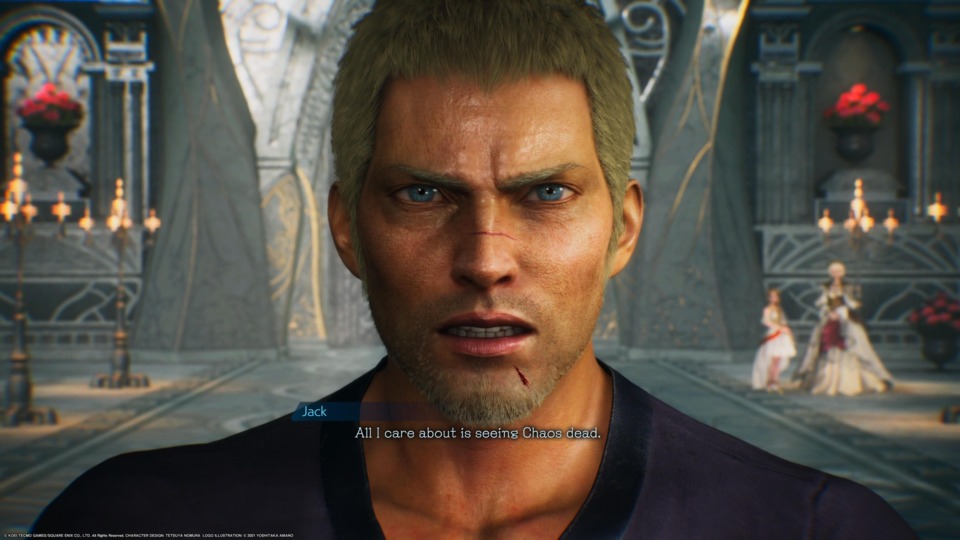
Yet, I should come clean about my feelings regarding Souls games: I don't like them. My dislike of From's Souls series is one of four video game "hot takes" that I know immediately disqualifies me from ever having a job covering video games professionally. The other three are:
- I'm not fond of Castlevania or Metroid games because I have a personal aversion to backtracking as a core mechanic.
- Final Fantasy Tactics is a mediocre tactic and strategy game carried by an excellent story.
- Fire Emblem got ruined during the handheld era when it prioritized the visual novel aspects over tactical strategy, and even Three Houses only partially eliminated the waifu garbage that makes Fates completely intolerable.
When it comes to From and their current approach to game design. It's okay if everything I am about to say doesn't matter or detract from your ability to enjoy their works, especially Bloodborne or Elden Ring. You do you. Nonetheless, I'm not waiting for them to give a shit about basic quality-of-life designs in their games. It's obnoxious that, to this day, From's narrative storytelling and worldbuilding rely on you reading in-game tomes and descriptions for weapons. I'm done with the clipping issues in their games, especially when a gigantic golem boss swings a massive axe, and it clips through my cover and kills me. They have had over a decade to fix their collision detection issues and make weapons or actions not cut through parts of the environment. Their platforming has always been awful, yet they continue to put in the most frustrating and harebrained platforming sequences into their games. Those leaps of fate you need to take where you don't know if you are jumping into immediate death or entering a new location weren't even cute the first time, and they have aged as finely as a carton of milk. Finally, am I the asshole for wanting them to make a camera that can snap into place correctly whenever I fight a large-scale boss? Why the HELL do From cameras still struggle to show you more than 50% of the gigantic boss character models? That shit was a problem in Kings Field, and it still drives me up the wall in Elden Ring!

It's perfectly okay if none of that matters to you. You'll never see me, with my biases, come out and pen massive essays on why people are wrong to name Elden Ring their Game of the Year or why From is "ruining video games!" I have reached that stage in my life where I know what I like and can understand that not everyone will agree with me, and that's why the video game industry we live in today is so interesting. With the barriers to entry at an all-time low, there's something on Steam, Humble Bundle, the Xbox Series S/X, the PS5, the Switch, or itch for everyone! Oh, wait, what am I talking about? Did I lose my train of thought while grousing about From Software? Damn, I'm sorry about that. This blog is supposed to be about Stranger of Paradise: Final Fantasy Origin. Without further ado, let's jump into it.
Part 1: Man, The Start Of This Game Sure Is Something!
The staff working on Stranger of Paradise: Final Fantasy Origin deserve massive commendations for making a game that knows what it is and what it wants to do. That much is certain when you start its opening salvo of cinematics and set pieces. Never before have I seen a Final Fantasy title so perfectly communicate its tone and mood, since maybe Final Fantasy IX, as succinctly as Stranger of Paradise. The minute you boot up a new game, you watch a roughly two-minute cutscene in which Garland rips through the halls of the royal palace of Corneria as they snatch a princess. The viscera and frightened looks of the soldiers attempting to block his progress perfectly relay what Nomura meant when he said he wanted to make a game about an angry man. And then the game drops you into a boss battle against Tiamat, with two supporting companions, with zero context on what's happening or who any of the characters are that you are controlling. It's utterly strange, but given the game promises to provide a "strange" journey, it is a fitting introduction.
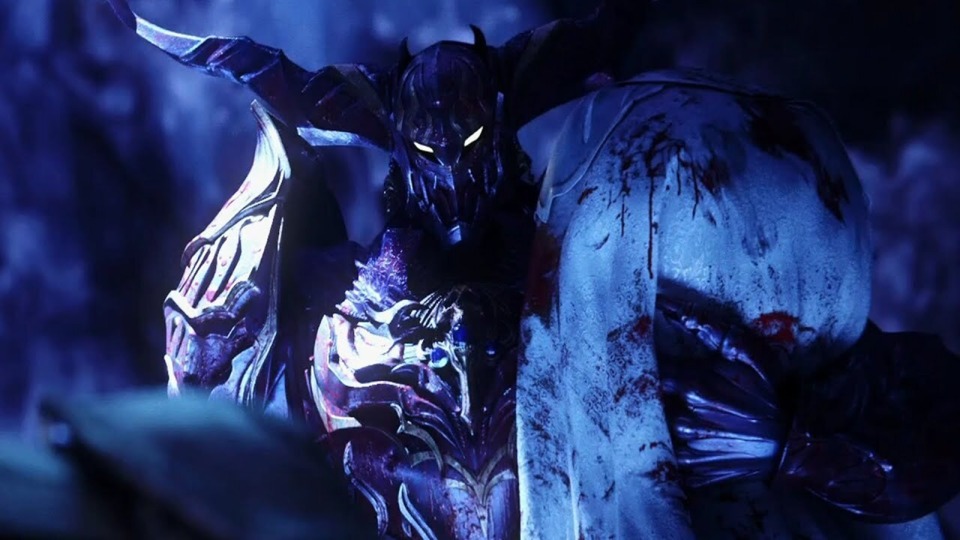
Unfortunately, that tutorial battle with Tiamat does not teach you the core mechanics well. I know Team Ninja has done the "drop the player into the middle of a boss battle to learn the ropes" trope before, but it doesn't work here for various reasons. First, with the appeal of Stranger of Paradise being your investment in a wide breadth of jobs and their respective tech trees, you are in no position to figure out which playstyles work best for you. Likewise, with the starting tutorial involving a boss, you suddenly have to worry about high-stakes, game-over-inducing attacks, which you are equally unprepared for at this stage. Yes, the context and animation cues on when to pull off the special moves to end this battle are not impossible to figure out, but there's enough nuance to the combat of Stranger of Paradise that this does a horrible disservice to the game. The tutorial environment in which you fight an endless stream of goblins as you perform a series of class-specific moves works far better than this sudden confrontation. And before you counter that this is a ridiculous suggestion, that field tutorial level, with a series of combat trials for the Warrior class, is the next goddamn scene, so I think I'm not off base in saying the order of levels here is weird.
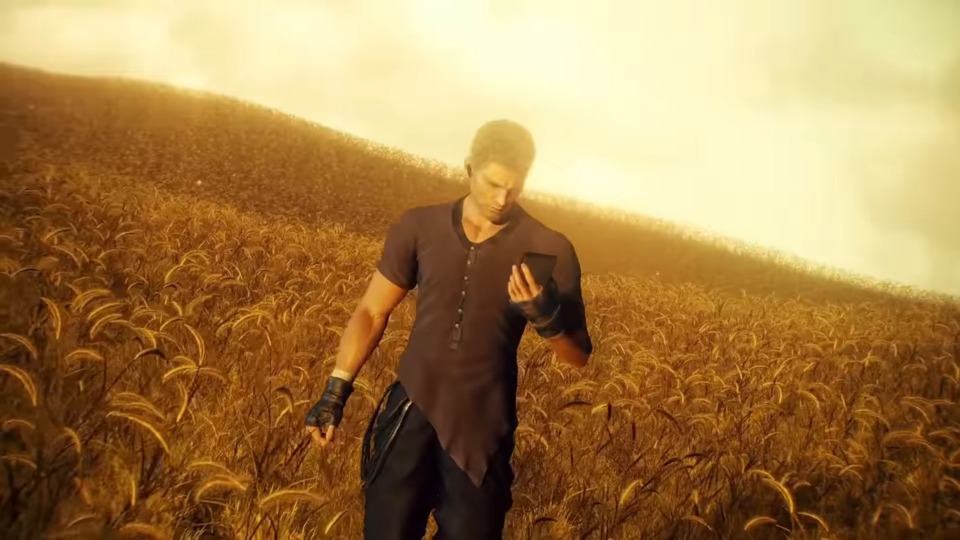
Speaking of sudden and disorienting juxtapositions, after you whittle away at Tiamat's health bar until it reaches the halfway point, the game smash cuts to black and then transitions to Jack in an empty field, and it is here we get the legendary scene where he listens to Frank Sinatra's "My Way." We still need to find out who Jack is, but instead, we have a contextless cutscene in which he's faffing around in a field with none of the other characters we saw in the two last scenes. One quick problem, if you played the demo when this game was officially announced, you know this scene uses the closest thing there is to a "Fair Use" sampling of Frank Sinatra. For reasons unknown to man, Square and Team Ninja only sample approximately twenty-ish seconds of the song and don't even get to its refrain, "I did it my way!" That was the case in the demo, and it's still the case in the game's full release, and as a result, the scene feels broken. On top of that, after completing the combat trials in the field, the game abruptly jumps to a new environment in which the party, all together now, talks about needing to help the King of Corneria before you seek audience with him. However, instead of that task being the next time you give the combat a whirl, the game cuts to the characters on a boat having completed whatever they set out to do. You see them beaten up and bruised and never learn what they did or fought.
Upon their return, they meet with the King of Corneria and get a basic explanation about Garland and the forces of Chaos running amock in the wildlands surrounding the kingdom. In a brief scene after that, you get a hint of a relationship between the princess and Jack. Why does the princess like Jack? I don't know, and the entire prologue feels like a fever dream. Maybe if the game had stayed with Jack in the field for a bit longer with the full version of "My Way," or there was an interstitial combat sequence wherein you fight a goblin king after boarding the boat the first time, this would all work better. However, that's not the case, and what you have is a game that reeks of "Peak Nomura" in that it is far more interested in giving you fanciful epic set pieces with exquisitely dressed characters than carefully stitched introductory characterization sequences. Admittedly, this game shows you its cards within the first hour, whereas other Nomura-led projects, especially the Kingdom Hearts games, take whole acts and upwards of tens of hours to relay even a smidge of what you should expect. Stranger of Paradise is a mess before you start your first "real" mission, and that's an accomplishment if I do say so myself.
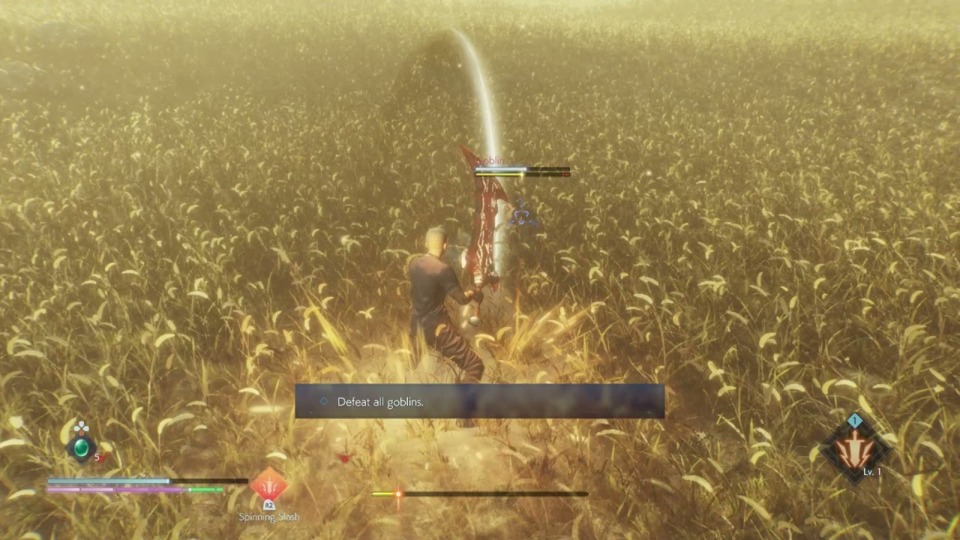
This game has three listed directors, none of which are Nomura, but you wouldn't know it while playing it. The story's complete lack of a filter, reliance on inopportune lore dumps, and lack of context-building lead me to believe that the lead writer isn't the only carryover from the Kingdom Hearts team. However, all of the checks and balances that were in place to prevent this game from being a nightmare either did not function or were so preoccupied with other obligations that they couldn't stop the Kingdom Hearts schlock from bleeding into this project, and I think we are all the better for it. Again, the only time things break for me is the utter lack of stitching between the many disparate set pieces you interact with and the long pauses between any progress with the main plot or Jack's backstory. If ever there was a game that warranted the "Start-Stop Storytelling" label, it's this one. And yet, when you get to those punctuated story moments, they are incredible, and the odd and unevenness of its structure end up making it more unique. Can you think of any modern video game that burns through four CG cinematics, a licensed song from Frank Sinatra, and a boss battle that is a baptism by fire in a single hour? I think not!
Part 2: You Sure Can Tell This Was Never A Top Priority!
Discussing some of the context surrounding Stranger of Paradise's creation seems appropriate. The game stands as a reimagining of the first Final Fantasy game. It is a collaboration between Square-Enix, particularly Tetsuya Nomura, and Team Ninja, a division of Koei Tecmo. This project is neither the first nor the last collaboration between the two, as Team Ninja also led the development of Dissidia Final Fantasy NT and Dissidia: Final Fantasy Opera Omnia. While Team Ninja took the lion's share of the programming and design of the game, the direction was a collaborative effort with Square-Enix's Daisuke Inoue, the lead battle design planner of the Final Fantasy XIII series, working alongside Team Ninja's Hiroya Usuda and Nobumichi Kumabe. Kazushige Nojima, the lead behind Advent Children, Crisis Core, Final Fantasy X, and the Kingdom Hearts franchise, assumes most of the writing duties, but more on him in the next episode. The game was a passion project of Tetsuya Nomura, and he, predictably, became the game's lead character designer and creative producer after it finally got the green light. If that sounds like too many names to process, consider the game sports three composers, directors, and producers. This game should suffer from having too many cooks in the kitchen, and while it does, it's not to the extent I would have predicted.

When Nomura first conceived the game following the release of Dissidia 012 Final Fantasy, Team Ninja was in a sizable transitional period. They were less than five years removed from founder Tomonobu Itagaki getting kicked out of Koei Tecmo following sexual assault allegations. Also happening was Dead or Alive 5's cratering with the fighting game community as well as the problematic development cycles and releases of Ninja Gaiden 3 and Yaiba: Ninja Gaiden Z. To call Nioh a "course correction" for the studio is an understatement. Before Nioh, it was shedding talent following every game release and had a revolving door of leaders. This fact is incredible when you consider Nioh fell into considerable development hell after being one of the earliest games demoed for the PS3 in 2004. The eventual leader that strongarmed the studio and Nioh to the finish line was Yosuke Hayashi, who would eventually get a promotion to Executive Producer following Nioh 2. Nonetheless, before Nioh came out, to support its development and completion, Hayashi changed the core business strategy of Team Ninja to pivot away from its portfolio of original IPs to contract work and collaborations.
This strategy is far from alien, even in Japan, with PlatinumGames being one of the clearest examples of it put to good use. However, there's no denying that Team Ninja is guilty of one of Platinum's common pitfalls with this project direction style. The goal is always to have a big project funded by all your contract-based projects, and the arrangements come in as quickly and plentiful as possible. For Platinum, it is the Bayonetta franchise, whereas, for Team Ninja, it is Nioh and Wo Long. Nevertheless, none of this mercenary work is ever allowed to rise above a certain level of quality, and there's no denying that you can tell which contracts were better funded than others. For every gem like Astral Chain or Fire Emblem Warriors, you get something like The Legend of Korra or Marvel Ultimate Alliance 3: The Black Order. In the case of Stranger of Paradise, the project is caught somewhere in the middle of Team Ninja's quality assurance. The input from Square-Enix assisted them in devising a wholly novel and pleasurable job system. Still, there's no denying that it never got the funding or time to transform into something that felt like a proper spin-off in the Final Fantasy series. Say what you will about Dirge or Crisis Core, but you can tell those games were valued by more than a small slice of Square-Enix internal.
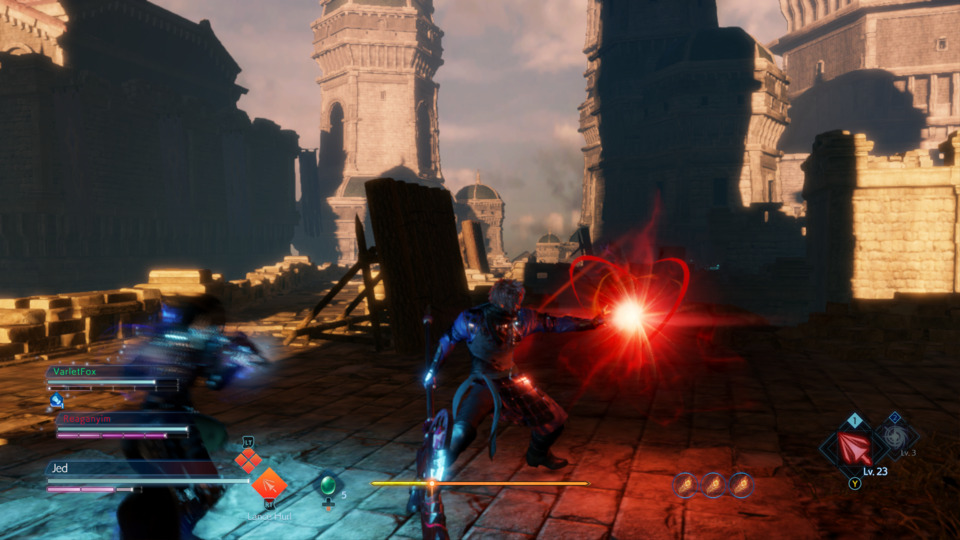
While I can't deny being impressed by some of Stranger of Paradise's levels or re-imaginings of legacy backdrops, the game is sometimes downright ugly. While Jack's grimace certainly seems well-animated, all of the NPCs come across as auto-generated models you'd get from a default license with Unreal Engine. The jobs are fun, but you quickly notice how most are permutations of a core set of five, and as such, end up seeing the same finishing moves and animations more than you'd like. Compounding that problem is the lack of enemy variety, another arrant reflection of the game's lack of budget and development time. Every new environment introduces one to two enemy types after the first two levels. However, you still see enemies from the game's first act throughout your adventure with Jack, even into the game's penultimate level. The side quest system feels like a complete afterthought, and the same sentiment applies to the UI/UX of the menu-based overworld. The option to interact with NPCs to learn about their daily goings-on is one of the most bizarre inclusions in the game. Then there are the technical issues! Despite not being a beauty, the game struggles when you get into some more complex and particle-based attacks or finishers. Also, some of the more enormous bosses not only have derpy animations and AI but cause the game to dip well below 30 FPS.
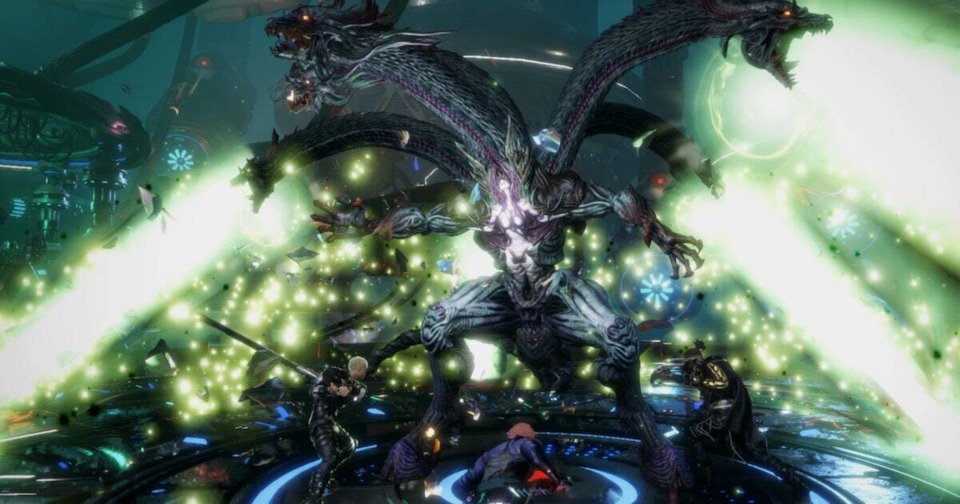
All of this is not entirely Team Ninja's fault. As you play Stranger of Paradise, you understand that the game was a fun side-project, not a priority, even for Square-Enix. Nomura loved the damn thing, but even his clout only gave the game a mid-tier budget and about two years to bake in the oven. Somewhat hilariously, while some like to call the game "Nomura's baby," with the "story of an angry man" quote as evidence, all signs point to him having an incredibly tight leash. When Square-Enix first announced the game, Jack being Garland was a closely guarded secret, but when everyone, and I mean EVERYONE, called it, Nomura's higher-up convinced him to rewrite that plot element. When the game's first playable demo launched and people got their asses handed to themselves, we didn't see the typical heel digging we generally see from him. Instead, they rebalanced abilities, classes, and companion commands to make everything more manageable. The big shots at Square-Enix wanted this game's development to cycle quickly before it bled money. Stranger of Paradise was undoubtedly a "team effort," but one no one working on it wanted to last more than a few years.
Tangent: THE PC PORT OF THIS GAME IS STILL ATROCIOUS!
Okay, let's say you read this mini-series for Stranger of Paradise and come away confident you want to try it. My advice is to avoid the game's PC version like the plague. While I know the console versions have their share of issues and lack mod support, the PC port is so compromised I have difficulty recommending it under any circumstances. For those who have played the game, be mindful that whatever framerate issues you encountered on PS5 or Xbox Series X are significantly worse on PC. There's constant hitching with every finisher, and some environments are so poorly optimized the game can never go above thirty frames per second. Sure, the godawful menu for the inventory system, which we will discuss shortly, is slightly better on PC. Still, the menu generally reeks of something designed for a console set-up and a living room television, as the real estate on a computer monitor feels incredibly cramped and busy, and I played it on a 27-inch monitor.
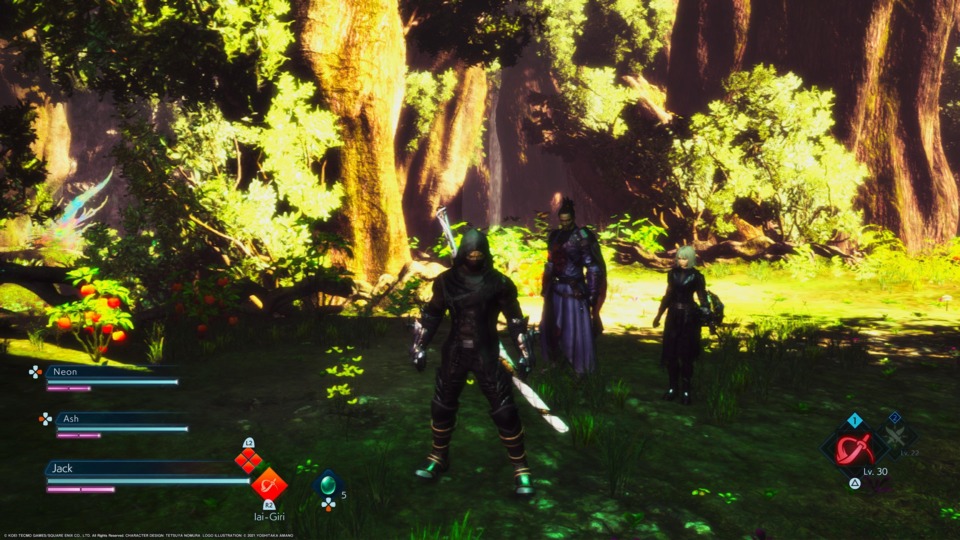
The reason for these technical issues is comical. With the PC version, sleuthing players discovered that the game has a multitude of unoptimized shaders and textures, which lead to some characters, NPCs, and enemies having approximately or more than 30 MB of geometry. In the non-patched version, you could be dealing with a single enemy with 300,000 unoptimized polygons, with a party of three having twice as much each. The game's console versions received immediate patches to address this problem, whereas the PC port had to wait months before seeing any improvements. To add insult to injury, some patches and updates for the PC version are less comprehensive than the console versions. The bitrate on the pre-rendered cutscenes was partially fixed on PS5 and Xbox shortly after its release, while that remains a problem on PC. One of the most common workarounds, I shit you not, is downloading a mod that makes all the characters bald. I gave this a whirl and was shocked to discover it worked. Things may have improved in the half year since its release, but judging from the user reviews for the Steam release, which came out in April of 2023 after its timed exclusivity contract with Epic expired, that doesn't seem to be the case.
Part 3: GOD DAMN, Is The Inventory System THE WORST! THE. WORST.
Nioh and Nioh 2 went on to influence a lot of the design in Stranger of Paradise. Most of these influences are positive, like the job system and the varying playstyles you can explore therein. Unfortunately, not all design carryovers work. The most problematic one involves inventory management. In the Nioh games, you have a proper Souls-like smithy and armor and weapon creation suite, which allows you to improve your character by giving them new tools and garb. I'll admit the blacksmith mechanic in Nioh is by far one of the most intimidating mechanics in the entire game, but Team Ninja mercifully improved it in Nioh 2. Nonetheless, your progression in both games is tied to managing scarce resources that can lead you to pivot how you play and approach upcoming combat scenarios. With Stranger of Paradise, Team Ninja decided to open the floodgates and give you almost everything worth using whenever moving from Point A to Point B in each environment, and that seems like a far worse alternative to every possible struggle you'd have trying to parse out the blacksmith in Nioh.

The issue here is simple. Stranger in Paradise gives you way too much shit whenever you traverse through and complete a level. The number of times I needed to spend upwards of ten minutes between main story missions junking redundant or useless armor sets or weapons upon finishing a quest was ridiculous. Worse, because the game constantly inundates you with random tat, you often find yourself never becoming attached to articles you affix to your characters for too long. Anything you gain at the end of one level will be replaced by something you pick up in the next. Even if you find a fun or creative outfit, there's a high likelihood you'll need to junk it after one level. That's not entirely antithetical to the core design of Nioh or Souls-likes. Still, the immediacy of Stranger of Paradise's planned obsolescence rubs me the wrong way. In Nioh or Elden Ring, a massive climactic boss might force you to switch things up and try a different build. With Stranger in Paradise, because almost every job class is viable, but the game is still programmed to bestow trinkets for every one of its core class types, you feel overwhelmed with your upgrades within hours of playing it.
Even worse is the interface and menu you must interact with when you play around with the cosmetic and combat upgrades. Someone at Square-Enix told Team Ninja that menu-based inventory and combat systems were a must in this game, and it sucks. There are so many menus and sub-menus. Worse, the game's "Auto" button is not nearly as helpful as it should be. That button does not consider the job affinity mechanic, wherein if you equip characters with clothing attached to a job, they will gain new abilities and buffs. Additionally, clicking the "Auto" choice on the equipment screen applies a pure DPS build to ALL OF YOUR CHARACTERS and not simply the one on the screen when you select that option. I found that last part out the hard way after spending about ten or so minutes trying to find the best pieces of equipment for a magic build for Jack and then a tank build for Ash, and by the time I got to Jed, I was tired enough that I thought about letting the computer do its wonders with him. To my horror, all of my work on Jack and Ash went down the drain after I clicked the auto-equip button, and I found them dressed in pop-punk garb as if they had walked through a Hot Topic circa 2005.
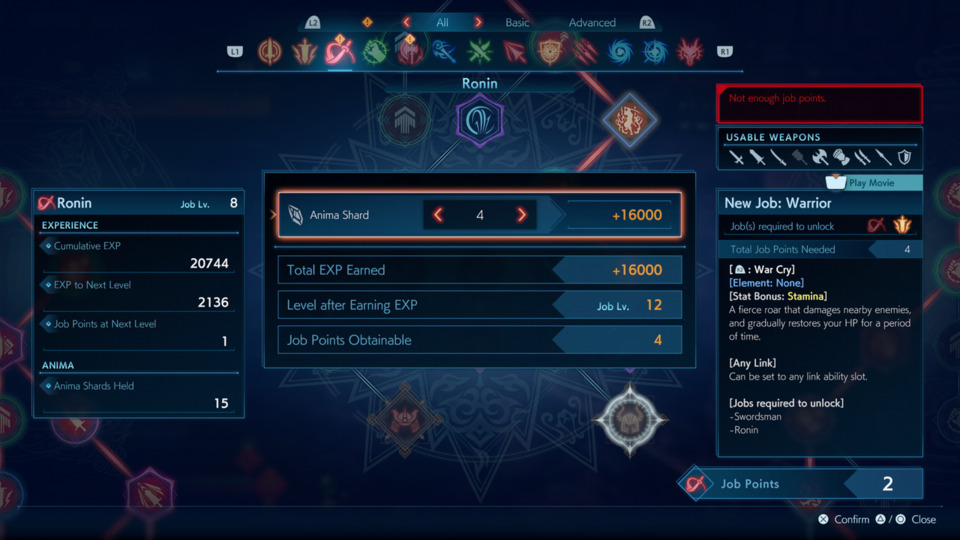
The point here is the one way the game tries to make your interactions with the fiddly inventory and equipment systems more efficient does more damage than good. Yes, there's a menu where you can select an assortment of modifiers to cull your loot trash, but it is thoroughly buried in the Overworld, and the game makes one marginal passing remark about its existence. Even then, the game gives you six hundred slots, and they fill up fast when random mooks pop out two to three trinkets by default. While there is overlap with the different "flavors" of jobs, the weapons and equipment are each classified to individual jobs, meaning the game is likely programmed to provide an even distribution of everything rather than for the jobs you commonly use. There are a few positives about that, though. Because you always have so many tools in your toolbox, trying out a class for the first time at level one is easier than you'd expect. Also, the variety of the weapons and the wildly different ways they control do wonders to communicate the nuances between every job. However, those are small hollow victories compared to the systematized drudgery in Stranger of Paradise.
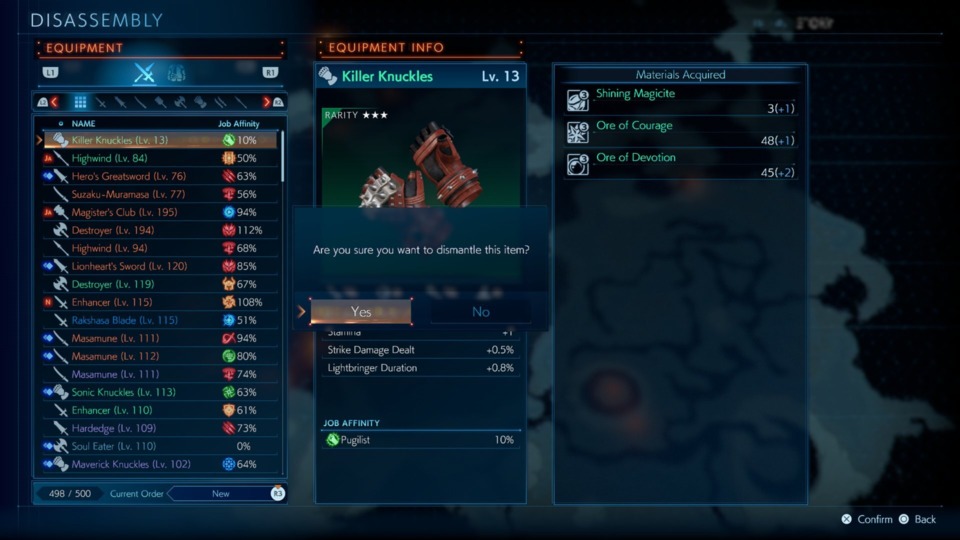
Tied to the fiddly menu system is the smithy, which might as well not exist at all. Refining useless inventory items into raw materials and then using those raw materials to improve pieces of equipment is not only time-consuming and frustrating but also pointless. Because the game keeps you littered with leveled equipment, the incremental improvements you get by interacting with the blacksmith almost always become fruitless exercises. All of the issues with the inventory system lead to the single worst problem with Stranger of Paradise: downtime. Even if you opt out of one or two of the systems or menus I described, you'll likely spend ten to twelve minutes on the overworld fanning through trinkets and figuring out your builds for upcoming environments. This rigmarole is neither fun nor rewarding because every screen is so dense with information and stats, and you do it constantly. Even if you enjoy one or two jobs, opting out of experience points or class progress while trucking through bosses with maxed-out jobs removes you from the gameplay feedback loops that feel rewarding. Likewise, if you have any issues with analysis paralysis, you should stay as far away from this game as possible. Because comparing the stats between two articles isn't the most user-friendly experience, you often need to squint for minutes upon end at random decimal places to determine which sword or battleaxe is the best.
Part 4: But Hey, The Job System Is AMAZING!
No, seriously, the job system in this game is amazing! If there is one thing worth mentioning, it is that Team Ninja designed Stranger of Paradise not to be wholly representative of the Souls-like genre. Sure, when you go to a save point, stuff respawns, and if you die before reaching a save point, you lose out on class progress. The roll has I-frames, and you need to pay attention to enemy animation cues during boss confrontations, but that's where the similarities end. One of the most significant differentiators between Stranger of Paradise and the Dark Souls series comes with its job system. While most traditional Souls-likes lock you into a job selection from the start, Stranger of Paradise actively encourages you to swap Jack and his compatriots' classes however you see fit before starting a mission. And there isn't even the slightest penalty for retooling your characters! If you want to give a job a whirl for the first time, have at it, and if you end up hating it, the experience you put into that job is NOT wasted time. Part of that stems from the tech trees assigned to every possible job assignment. If you want to unlock every tool or combat resource, especially the advanced and expert ones, you must find branches and nodes in every job. To highlight, the starting mage will unlock the white and black mage jobs, which lead to the Sage.
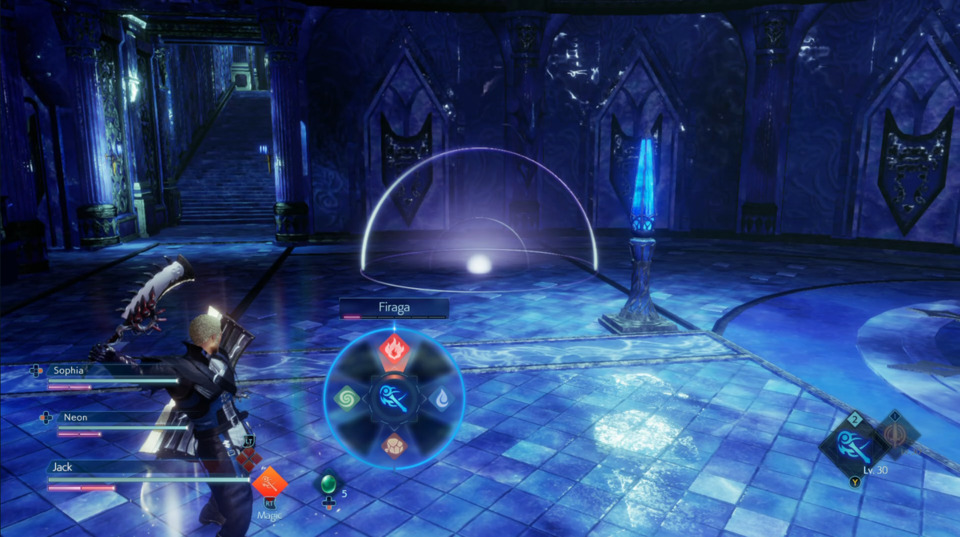
These tech trees might seem like the most lizard-brain, B.F. Skinner-approved things imaginable when you first look at them, and that's undoubtedly true. There are too many options to process, and some unlockables, like new moves, are too obtuse or esoteric for their own good. Nonetheless, the game synthesizing the myriad of raw materials and pool of resources indicative of the Souls genre into one collection of experience points lessens the blow. It's also one of the most compelling gameplay feedback loops I have ever experienced. The minute you unlock your first new ability or advanced class, you start to pan over all of the game's options and engage with a slightly heady calculus on what to sport for your next mission so you get more fun goodies and job assignments. This design, in turn, forces you to engage with playstyles and mechanics you usually wouldn't, and as I suggested earlier, a lot of effort was put into the game to ensure virtually every job is viable. What's more, even if you encounter a job type you dislike, Stranger of Paradise has the decency to provide spendable resources that allow you to level up unused jobs immediately so you can continue exploring its options.
Even if you have your steady preferences, Jack can have up to two classes, which means you can still assign him a maxed-out job that you love, along with a new one you want to try for the first time. Moreover, the game's passive buffs ensure you don't immediately discard even its starting classes. Every passive buff stacks, and even if you feel hesitant about reusing an older job, if you unlock the affinity spheres on its tech trees or use affinity-raising weapons or equipment, you can send a nominal amount of experience points to that job. In my case, while playing the fourth level while controlling a Lancer, which was getting 100% of my experience points, my Duelist was getting about fifteen percent of my experience points. By the time the mission was over, I had a few pips to spend even though it hadn't been in my rotation for hours. Nothing associated with the game's job system ever feels entirely out of the loop, and that's doubly the case with the affinity system I just mentioned. Investing in a single job's weapon and equipment type will unlock passive and active buffs Jack can use on tap. What's fun is you can have one active job and spec Jack's equipment to open a different job's affinity bonuses.

One thing related to the Job System is the game's parry mechanic. This mechanic is a universal system wherein Jack can trigger a parry while an enemy attacks. If you time it right before the attack lands, you interrupt the enemy and immediately initiate a new combination of attacks against that target. I loved this mechanic for three reasons. First, it is snappy and incredibly responsive, with the windows for the parry being more and less generous depending on your enemy. For example, parrying a bat is far easier than a dragon. When you pull off a full parry, the immediacy of the transition into your combo is an absolute delight and can be all the difference between victory and defeat in the more pivotal battles. Second, there's a slight risk-reward mechanic as you cannot infinitely be in parry mode, or else enemies will simply doge Jack or attack him differently. Jack's Soul Shield ability has a tighter window to pull off, but it allows him to absorb enemy attacks and either bank them or immediately throw them back. Banking spells and enemy specials are a fun way to circumnavigate the magic limitations of some of the non-Mage classes. Finally, the parry system is variable across certain classes and weapon types. For example, the Swordfighter can initiate a full parry without worrying about timing, but at the cost of magic points, and Maces and Katanas have even trickier parry windows but deal massive damage when you pull them off.
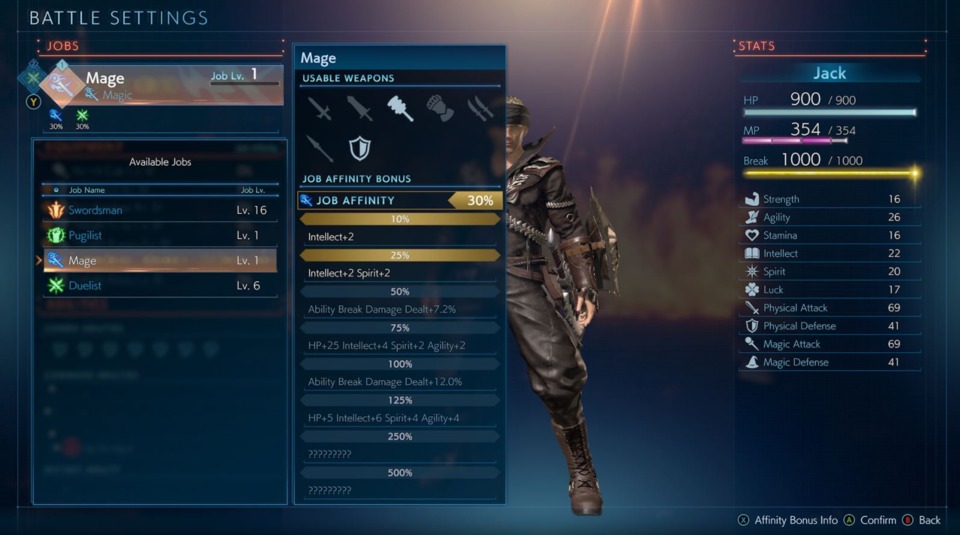
Nonetheless, nothing in the world of video games is perfect. I've already said my piece about the equipment and inventory system, but the game's unintelligible iconography bears repeating. There's a use of overlapping colors to indicate when jobs are connected, but the icons start to blur when you get closer to the end. Costume sets and what they lock away aren't clearly signposted. Playing around with Jack's jobs is entertaining, but fiddling with his co-conspirators is far less rewarding. It also does not help that the commands you give them are so basic it's easy to forget they're even there. Correspondingly, the limited nature of your commands for your party members further compounds the feigning sense of investment you have with them. More problematic is the menu for editing your finishers and command abilities. I tried to edit my finishers and combos whenever I unlocked new job abilities on the tech trees, but bopping out of the tech tree to the move list is a challenging process, and the menu for editing those combos is unintuitive. The Command Ability system is even more tucked away and annoying. When you level up a job enough, you'll get its unique command ability, and Jack can have up to four of these. However, some of these abilities are incompatible with specific jobs or weapon types. For example, the Swordfighter's Shield Bash requires a shield on hand. And again, retooling your character, needing to go back and review your command abilities, and identifying incompatibilities add to the game's issues with downtime.
Tangent: I Need To Talk About The Lowest Difficulty Setting
There is another way that the previous works of Team Ninja went on to inform the development and design of Stranger of Paradise. One odd way is how the mindless musou sensibilities of Hyrule and Fire Emblem Warriors helped Team Ninja devise ways to opt non-Souls fans into Stranger of Paradise. When you first start the game, you are presented with three playable difficulty options: Story, Action, and Hard. The fourth, "Chaos" difficulty, is unlocked after beating the game, and there are newer and more difficult settings for the DLC. Unlike other Square-Enix products or Souls-likes, you can switch these settings whenever you like; you just have to remember to do it in the overworld before starting a mission. That alone is a godsend to anyone unfamiliar with the genre or isn't sold on it, like me. I played the game almost entirely on the default Action setting before trying the Hard and Story ones. Predictably, the harder setting results in enemies doing more damage and taking longer to beat, and it makes the game's parry mechanic all but a necessity. However, the "easy" Story setting does a few things I thought were incredibly interesting.
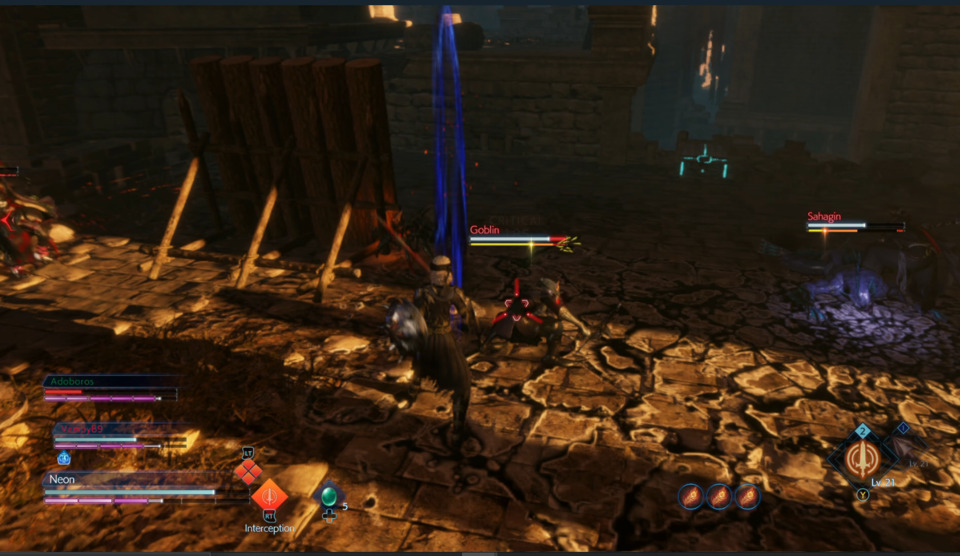
For one thing, the Story setting makes all the player's guards and blocks unbreakable. That means there are no ultimate attacks from bosses to worry about dodging or parrying. Even when Chaos belts out bolts of plasma or is rearing to kick you in the face, you can block everything by simply putting up Jack's dukes. Likewise, enemies don't have invincibility frames. There are no terrifying moments when you see a giant baddie powering up their next big AOE spell, and you can't wail away on them. Combining these two things gives you a significantly different experience in Stranger of Paradise that mimes a Musou more than a Souls-like. The lowest difficulty setting might as well be called "Warriors Mode" because Team Ninja designed it to play and feel like Hyrule and Fire Emblem Warriors. This modification is something only some Souls-like developers should consider, and, obviously, not all of them. Still, I commend the developers at Team Ninja for opting more people into their game and its systems by recognizing that some people going into Stranger of Paradise want to see its silly nonsense and don't have time to bother with its core mechanics. You still get more out of the game by opting into its standard and higher-difficulty settings, which better tie into the game's job system. However, there's no denying that the Musou-lite Story Mode fits the game's storytelling aspirations better. So, if you liked Fire Emblem Warriors, this game might be for you!
Part 5: I Wish The Storytelling Were More Consistent
Investing in the job system and finding new playstyles or build paths was my primary motivator to finish Stranger of Paradise. After showing so much promise from the onset, the story halts to a standstill until you initiate its final act. You have stilted exposition with the king and princess and some of the most worthless NPC interactions in Final Fantasy history to hold you over. What's bizarre is how the game tries to sell you on the idea of Jack being a person of mystery. Not revealing all the answers to that quandary is all you get to keep you narratively invested in seeing Jack's adventure continue. Jack's stern attitude certainly is meme-worthy, but it also stunts his and his companions' character growth and development. In one such case, Jed attempts to recollect a dream he's been having, and rather than let him finish, Jack replies, "No one cares about your dreams!" Banter is almost entirely superficial and generally connected with the most surface-level observations about your surroundings. Instead of discovering why everyone likes Jack organically, you listen to the most barebones joshing between your companions during long contextless combat sessions. Sure, the first few times when Jed and Ash announced the presence of cubes to indicate an upcoming save point was adorable, but that keeps happening.
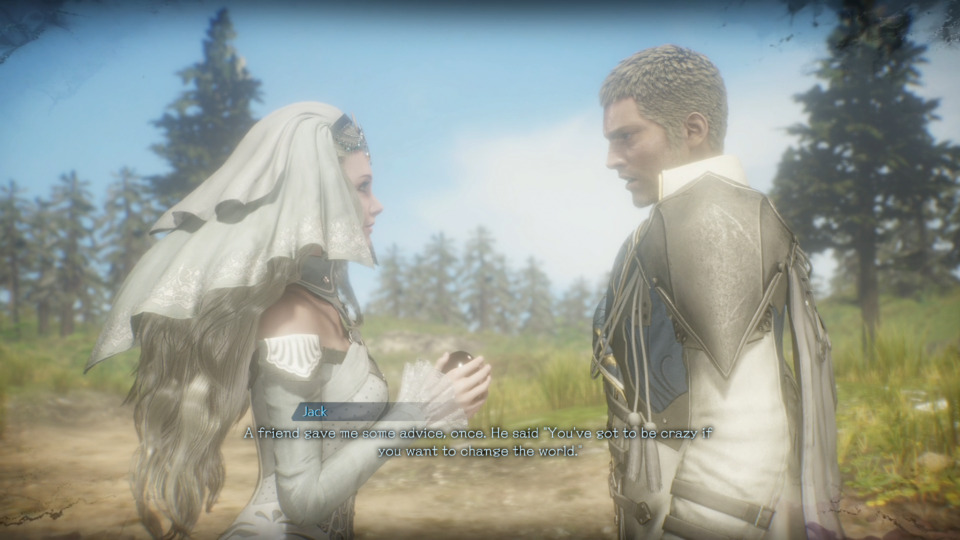
Yet, when the story does kick in and doles out the schlock, I'm back in it. After accepting the king's mission to save the Kingdom of Corneria from the looming threat of Chaos, you can talk to the princess and other NPCs about life in the kingdom and their initial impressions of Jack. These NPC interactions are surrealist art. All the faces that are not the player characters err toward the uncanny valley. The environments that own their source material certainly pop, but this game is generally hard to look at when you are not in motion. The settings are linear, with vanilla-ass switch puzzles that become tiresome after the third level, and the ones that take place inside building interiors don't stand out all that well. Whenever the game tries to engage in essential worldbuilding, you can tell that's not where the money went. Even worse is how core points of worldbuilding are contained in tooltips and load screens at the start and end of levels. When you first load up the pirate bay with Bikke, the load screen mentions it comes from "Dimension XIV," which is your hint it's a recreation of a level from the massively popular and critically acclaimed MMORPG Final Fantasy XIV. That's crappy storytelling! If you don't read those tooltips, then the plot twist near the end of the game hits you like a sack of bricks!
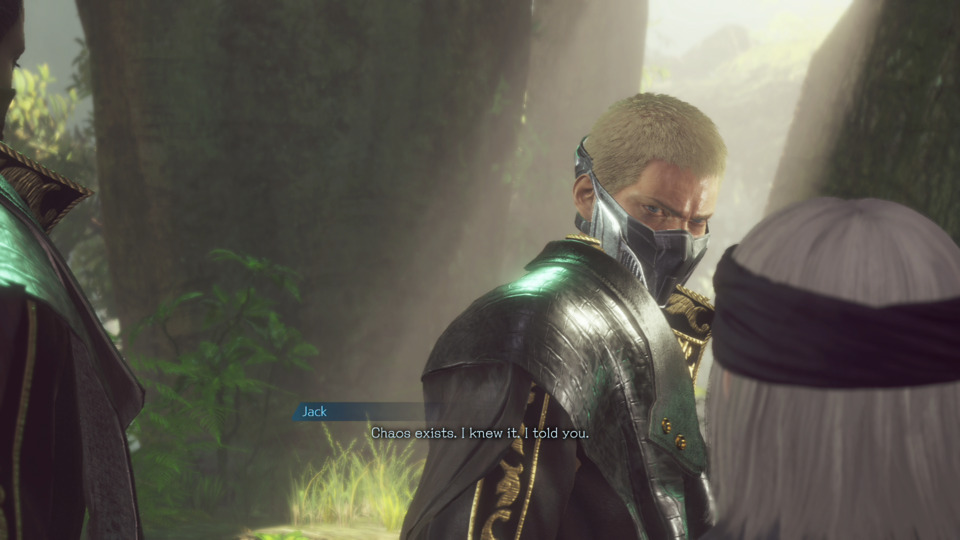
The recreations of Final Fantasy levels certainly help, and I will not sit here and lie to you that I didn't smile when I went through the Mount Gagazet or Pandemonium Castle levels and didn't nostalgically think about my previous encounters with those backdrops. However, even the best environments feel incredibly limited in their scope because of their stark linearity, and what few bespoke corners there are always lead to treasure chests or, worst, data logs that fill in critical gaps in the narrative. It's a storytelling crutch as old as time but with the base game only partially interested in giving you broad vinegar strokes on who the characters of the game are and why they're doing what they're doing, relying on data logs and journals that need to be collected seems like malfeasance. Understanding Astos and how he figures into Jack's journey is almost exclusively conveyed through these collectibles, and it sucks. Also, the team that made this game made the wrong choice for some of the levels they picked to express their respective games. The Fire Cavern is one of the most generic levels they could have tapped to represent Final Fantasy VIII, and the endless office spaces of Insomnia are the last thing I would have picked for Final Fantasy XV.
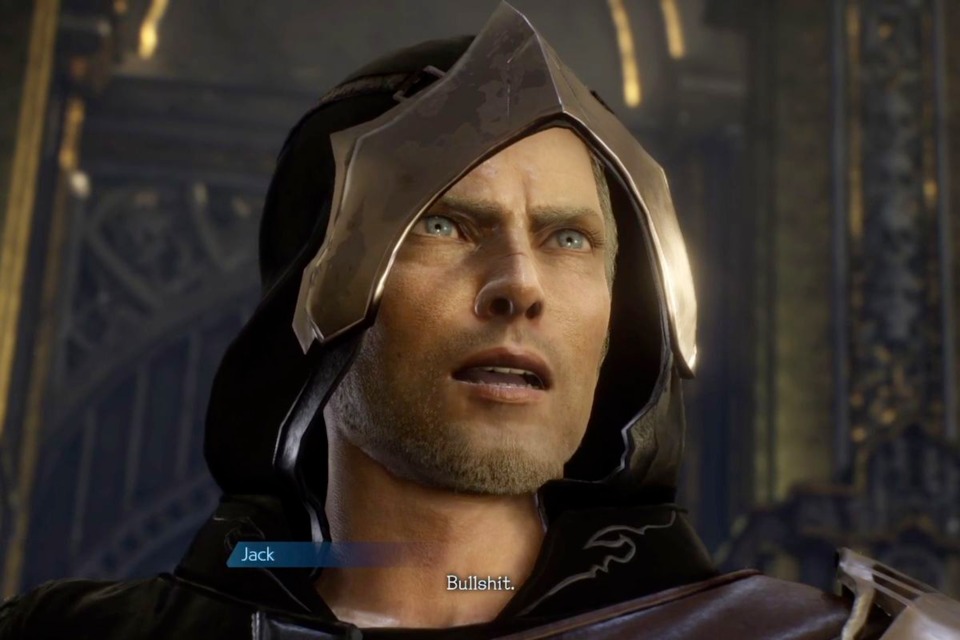
Nonetheless, your first mission to beat Garland goes smoothly until you find a silver-haired young woman in a Japanese schoolgirl sailor outfit inside Garland's armor. The task after that is when the game finally breaks from its formula of adapting the first Final Fantasy game shot for shot. The mission after Garland involves fighting a pirate king named Bikke. Here, we discover that the crystals our four heroes are collecting are jet black instead of colorful representations of the four core elements. Likewise, when Neon tries to talk to make a point to Jack, he responds by saying, "Bullshit!" and then plugs in earbuds connected to a music player and starts listening to Limp Bizkit. This scene is what I mean by Stranger of Paradise doesn't understand how to pace itself. It drops that whopper with Jack's MP3 player and then doesn't follow it up with any subsequent weirdness until you watch a short cutscene after beating Bikke. The fight against Bikke points the party to Astos, who, after getting a thrashing, promptly gives Jack his mission objective for most of the game: kill the Four Fiends. After this, the game follows the same template of you accepting a mission in a new environment, 90% of that environment being slogs through mooks and random enemies, and the finale of the environment being a boss encounter that introduces a new puzzle piece to the story. It sounds normal, but I must stress that over ninety percent of your experience with any given level does jack to progress the story and characters, and that's why I refer to the middle of Stranger of Paradise as a "slog." It also does not help that it is here when you notice the repeating finishing animations or the game's scant ten different enemy types.
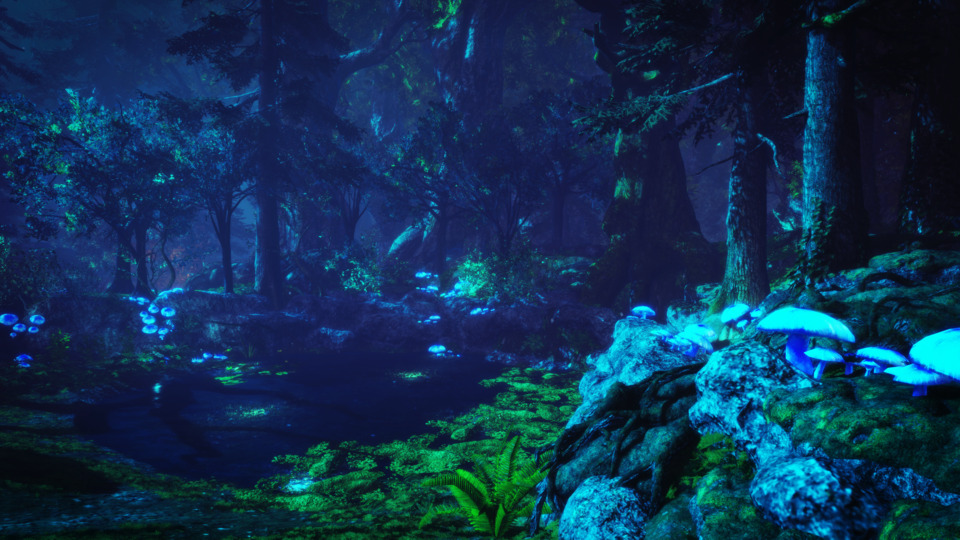
But again, right when I want to dismiss this game, it makes me laugh. There's a moment when your characters are ascending the highest peak of Mount Gagazet, and Jack's peers ask him why anyone would go on such a pilgrimage, and his exact words are, "Who fucking cares? We have a mission!" When you get to the Final Fantasy IV level, where everyone is in space, there is a moment when Neon says, "Wow! We're really high up!" and Jack's immediate response is, "Don't worry about it!" It's pure camp, and I love it! Watching multiple characters treat what they were experiencing with deft seriousness only to be greeted by Jack saying "whatever" is endearing. Nonetheless, when you meet Astos, it is around that point when you realize things are "weird" in the Kingdom of Corneria. Starting with our friendly dark elf, and during every lead-up to a Fiend, we see flashbacks to Jack and company's previous attempts to beat the Four Fiends, all of which failed. These flashbacks are a mess as they don't happen with enough frequency or coincide with character progress to make them significant until the climax, and when they do, they're so short it's hard even to understand what you've seen. Luckily, the game is so heavy-handed with its message that it's impossible not to know there's a time loop happening, and your friends know more about it than they're letting on to Jack. Again, it's immensely stupid, but I wish the game were dumber. I think it would be better if Stranger of Paradise fully reveled in its schlock from start to finish. Yet, the fact it doesn't makes it a more uneven experience, and that unevenness is part of the reason why I enjoy watching it. So, what do you think? Would this game be more satisfactory if it were better, or is it best when it doesn't know what it is doing? The next time you see me writing about Stranger of Paradise, we will discuss its ending and a Final Fantasy-based conspiracy theory I have.
